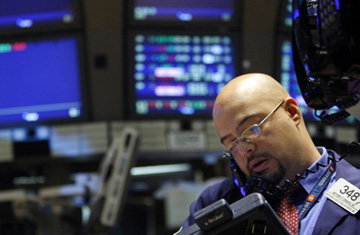|

A trader works on the floor of the New York Stock Exchange, November 17, 2008. (Xinhua/Reuters Photo)
Wall Street shares plunged to their lowest level in five-and-a-half years Wednesday on deep economic recession concerns.
The Dow Jones industrial average tumbled 427.47 points, or 5.07percent, to 7,997.28. It was the first time the Dow closed below the 8,000 level since March 2003.
The S&P 500 and the Nasdaq broke through last week's intraday lows, which were the lowest in more than five years. The Standard & Poor's 500 Index fell 52.54 points, or 6.12 percent, to 806.58. The Nasdaq Composite Index lost 96.85 points, or 6.53 percent, to 1,386.42.
Weak economic outlook
"The cost of living in the United States fell by the most on record and construction began on the fewest homes ever last month, evidence the economy is in the worst recession in at least a quarter century," said Benjamin Wei, president of the New York International Group, an investment bank based in New York. The October consumer price index (CPI) fell 1.0 percent, more than the consensus 0.8 percent, and the biggest ever monthly drop, while the core fell 0.1 percent, compared to a consensus 0.2percent increase, the Labor Department said in Washington.
"Today's CPI report signals deflation, or a prolonged price slide, may become another hazard facing Federal Reserve Chairman Ben S. Bernanke and President-elect Barack Obama. Deflation could worsen the economic downturn by making debts harder to pay off and countering the impact of Fed interest-rate cuts," said Wei. Commerce Department figures showed housing starts tumbled to an annual rate of 791,000, indicating the industry's contraction may extend into a fourth year.
"October housing starts fell 4.5 percent to 791,000, marginally above the 780,000 consensus, but permits tanked 12.0 percent to708,000, much less than 774,000 consensus," said Ian Shepherdson, chief U.S. economist at the High Frequency Economics Ltd., an economic research group.
"Alas the permits numbers are a better guide to the underlying state of activity than starts, which are subject to weather effects. So the 14.5 percent drop in single family permits is grim news, consistent with the plunge in the homebuilders' survey, reported yesterday," he pointed out.
"Housing activity seems to have taken another hit since the stock market plunge, along with most of the rest of the economy.
With construction at these levels, the inventory/sales ratio for new homes ought to drop quite quickly over the next few months, setting the scene for an eventual stabilization in prices, but right now housing is a disaster area," added the economist.
Federal Reserve policy makers last month predicted the U.S. economy will contract through the middle of 2009, with some prepared to lower interest rates further in response, a record of their meeting showed Wednesday.
Auto, financial stocks suffer Shares of General Motors Corp plummeted to the lowest in 66years and Ford hit a 26-year low as investors are concerned about a possible bankruptcy filing by U.S. automakers.
U.S. auto executives were on Capitol Hill for a second day top lead their case for a 25-billion- U.S. dollar aid package. However, prospects for a bailout getting done this week remained uncertain.
Citigroup, Bank of America, JPMorgan Chase & Co., and other financial stocks all slid to multiyear lows on persistent worries about the fallout that worsening credit and a contracting economy will have on banks.
Citigroup shares slumped a record 23 percent and credit-default swap spreads on its debt widened after the bank took on more than17 billion dollars in assets from structured investment vehicles and shut another hedge fund.
Bank of America was down 14 percent while JPMorgan shed 11.4percent. The S&P financial index skidded 11.6 percent. On Nasdaq, shares of Yahoo slumped 20.9 percent after Microsoft Corp's chief executive ruled out an acquisition of the Internet media company.
(Xinhua News Agency November 20, 2008) | 